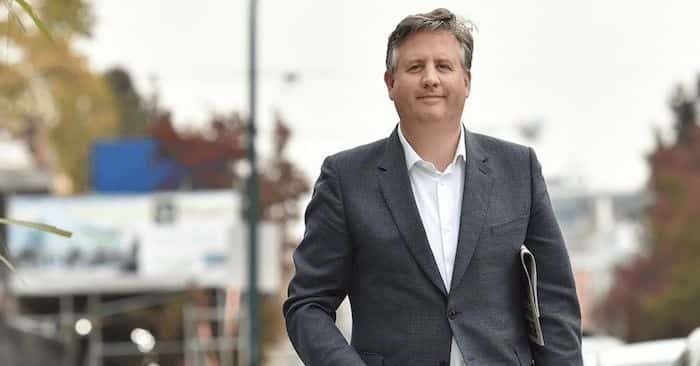 �鶹��ýӳ��mayor-elect Kennedy Stewart visits Glacier Media offices two days after the election. (Photo by Dan Toulgoet)
�鶹��ýӳ��mayor-elect Kennedy Stewart visits Glacier Media offices two days after the election. (Photo by Dan Toulgoet)
In four years from now, more than 400,000 eligible voters will get a chance to give Vancouver’s new mayor, Kennedy Stewart, a definitive performance review at the ballot box.
“C’mon,” said the voter, “give the guy a break—he just got elected!”
Point taken.
“And he may not seek a second term!”
But let’s say he does.
To help voters make an informed decision in 2022, I thought it would be helpful to have a handy checklist of the promises Stewart made in the campaign to track his progress, or lack of it over the next four years.
I’ve gone through my notes, his platform and the many emails I received from his campaign team dating back to May when Stewart announced he was running for mayor as an independent candidate.
Some of his promises require other levels of government to get on board, some—like the need for a renters’ advocate—were initiated under the previous Vision �鶹��ýӳ��administration of Gregor Robertson.
There’s also the fact Stewart is an independent mayor, without a majority to help him implement all his plans, some of which—85,000 homes over 10 years!—have an expiry date in 2028.
Anyway, here’s what I’ve come up with, knowing full well I'm likely missing a few promises he made during the campaign.
Here we go...
In his first 100 days in office, which began Nov. 5, Stewart promises:
- To hire more staff and make changes to clear a backlog of building permits, with a focus on rental housing projects.
- Hire a renters’ advocate to work with council and ensure renters have access to legal advice and advocacy they need to fight unfair evictions and rent increases.
- Set up an emergency task force in the Downtown Eastside, with the primary goal of tackling the opioid crisis and saving lives.
- Launch a review of city policies, particularly those related to taxes and permits, that impact small business.
- Require elected officials to proactively disclose assets and prohibit them from working outside city hall, if these activities are likely to conflict with their public duties.
- Prohibit officials and “key staff members” from accepting government contracts or lobbying for 12 months after leaving their positions.
- Create a lobbyist registry, which would require lobbyists to declare details of their activities in an online registry. Levy fines for non-compliance. Make the information available to the public.
His other promises:
- Build 85,000 homes over the next 10 years, with 25,000 of those non-profit “affordable” rental homes (so that’s 2,500 this year) for households making $80,000 or less.
- Fast-track 25,000 new purpose-built market rental homes and laneway homes over the next 10 years. To help achieve that goal, create a “purpose-built rental housing office” to provide a single point of contact and “increased certainty” for developers.
- Issue a report within first year that outlines how to make life more affordable for renters, including reviewing current policies and examining new measures such as freezing rents and adjusting rules governing short-term rentals
- Triple the empty homes tax.
- Expropriate “troubled” single-room-occupancy hotels.
- Negotiate a new �鶹��ýӳ��Agreement.
- On Kinder Morgan’s Trans Mountain pipeline: “If elected mayor, I will use every resource at my discretion to stop the federal government from building this new pipeline, including taking them all the way to the Supreme Court of Canada.”
- Require all elected officials and civic political parties to be subject to existing provincial regulations governing campaign finance between elections, including annual disclosure of donations.
- Require all civic election candidates and third-party advertisers to provide “regular disclosures” of donations between Jan. 1 and election day, during an election year.
- If city residents vote in the November provincial referendum to change to a proportional representation system, then future civic elections will be conducted using pro rep.
- If pro rep is rejected, then future elections will be conducted using “neighbourhood constituencies” (wards) similar to those used at the federal and provincial level.
- Launch an online petition system from the mayor’s office.
- Fully fund and implement the city’s women’s equity strategy.
- All drug policy options will be open for consideration, including initiating a safe and accessible supply of drugs “for those at high risk in the current illegal and dangerous market.” Expand safe consumption sites.
- Build 100,000 sq. feet of “affordable studio space” over the next decade “by integrating arts spaces into more public buildings and affordable housing developments and creating new purpose-built spaces.”
- Expand funding for small and medium-sized community-based art organizations and change the granting process to include individuals and groups of artists, and informal collectives.
- Review how the �鶹��ýӳ��Police Department charges for event security and help reduce costs for community events.
- Expand small-scale businesses, including corner stores, small cafes and laneway-based businesses. Laneway businesses would be live/work and protected from “the volatility of triple-net leases and property tax costs.”
- Create an affordable start-up hub, purpose-built for new tech start-ups to remove barriers and reduce costs.
- Work to secure federal, provincial and UBC funding to extend SkyTrain along Broadway corridor to the university.
- Work to expand the city’s bus network, including more night service. Investigate way to reduce fees for seniors, people living with a disability and those on low incomes. Support “All on Board” campaign to make all transit free to children and youth.
- Work with community groups in Chinatown to revitalize the historic district with a focus on promoting its culture to locals and tourists.
- And finally...call Courier reporter Mike Howell the day before next election to go over checklist.
So there you go, voters—something else to paste on your fridge.


.jpg;w=120;h=80;mode=crop)